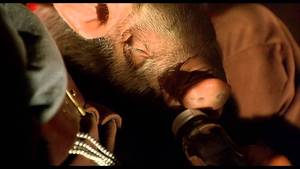Babe’s belief in his capability to function within his new identity role as sheep-pig is shattered when he learns his true purpose as bacon for the farm. Deflated of self-worth and betrayed by ‘The Boss’ he descends into a torrent of psychological self-harm, unable to eat at the prospect of his failed ambitions. [1]
As Farmer Hogget wraps the malnourished Babe in the blanket and brings him into the house, a close up shot of Farmer Hoggett’s face captures the emotive embrace of a paternal figure. The affection is returned by Babe whereby a proceeding close up shot of Babe signalling his acknowledgement of sentiment is interspersed by the soft tone of Farmer Hoggett’s melodious voice. Farmer Hoggett is known for his limited, efficient and monosyllabic dialogue-typified by the famous line ‘That’ll do Pig, That’ll do’. He is an authoritative figure of command, a god-like patriarch within the farmyard, referred to exclusively as ‘The Boss’. In this moment of mutual admiration Farmer Hoggett transcends the animal-human divide that is so often preached in Babe by forging an emotional connection with the pig. His harmonious and rustic interpretation of ‘If I Had Words’ is a symbolic representation of the breaking down of these long-established hierarchal food-chain structures.
The camera then cuts to a high angle shot from the perspective of Farmer Hoggett and his simplistic song awakens ambition and pride within Babe as he begins to suckle on the hand-held bottle. Farmer Hoggett attentively places Babe down and the camera moves through a series of alternating, fast moving shots of Farmer Hoggett bellowing the remainder of the song and, most unexpectedly, comically flailing his arms and legs in a highland dance. His soft voice is synergized with a grandiose orchestra led by a flute and the beat of tribal drums. The pace of the drum beat quickens as it mimics Farmer Hoggett’s heart beat. A slow-motion aerial shot shows him jump in to the air as a climatic completion of their acoustic dialogue of friendship and trust. At this moment their unity is emphasized as Farmer Hoggett has fulfilled the familial void that caused Babe to forge a new identity as a sheep-pig at the beginning of the narrative.
Noonan creates a sensory euphoria that is a ritualistic recognition of their broken silence and, in turn, a fracturing of animal-human archetypes: one that defines the hierarchal infrastructure of the farm yard. Although not communicated directly, their synergy is explored through Noonan’s emphatic and emotional mise-en-scene. At this pivotal moment the film’s moral message that ‘you can be whoever (or in Babe’s case whatever) you want to be in life’ resonates most. This compassionate sequence of mutual respect and acceptance symbolises the importance of defying stereotypes, thus utilising the heart-warming relationship of the human and animal to provide a child-friendly platform to indoctrinate younger audiences with moralising narratives.
[1] Babe, dir. by Chris Noonan (Universal Pictures, 1995).
